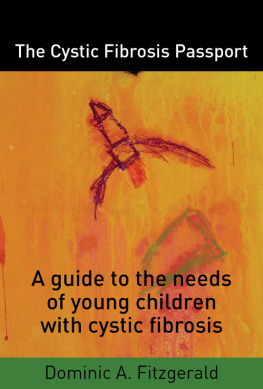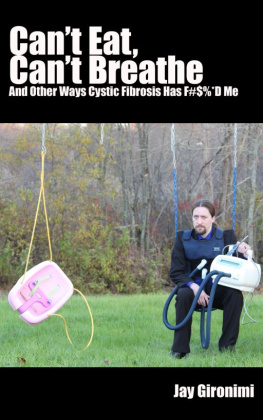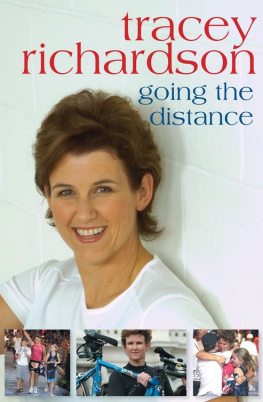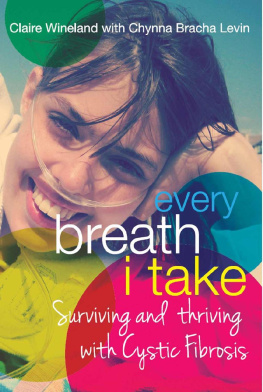The Cystic Fibrosis Passport
A guide to the needs of young children with cystic fibrosis.
Dominic A. Fitzgerald
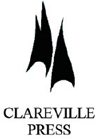
Publisher: | Clareville Press 10 Rule Street Isaacs ACT 2607 P.O. Box 110 Mawson ACT 2607 |
Phone: | 0413 982 224 |
First Edition 2013
Text and digital Copyright Dr Dominic A. Fitzgerald 2012
The moral rights of the author have been asserted.
This book is copyright. Apart from any fair dealing for the purpose of private study, research, criticism or review, as permitted under the Copyright Act, no part may be reproduced by any process without written permission of the publisher.
Disclaimer
The contents of the book and e book are provided as general information only.
Before relying on the material in any important matter, users should carefully evaluate its accuracy, currency, completeness and relevance for the purposes, and should obtain any appropriate professional advice relevant to their particular circumstances.
Links to other websites are inserted for convenience and do not constitute endorsement of material at those sites, or any associated organisation, product or service. The author accepts no liability (including liability in negligence) for and gives no undertakings concerning the accuracy, completeness or fitness for purpose of the information provided. No reliance should be placed on the information provided when making a decision affecting your own interests.
National Library of Australia
Author: | Fitzgerald, Dominic A. |
Title: | The cystic fibrosis passport: a guide to the needs of young children with cystic fibrosis / by Dr. Dominic A. Fitzgerald. |
Edition | 1st |
ISBN: | 9780909278298 (pbk.) |
Subjects: | Cystic fibrosis--Australia. |
Cystic fibrosis in children--Australia. |
Dewey Number: 616.372 |
Design: | jankemedia |
Printer: | Prolong Press Hong Kong |
Cover drawing by Samuel Fitzgerald Samuel Fitzgerald
Preface
The purpose of this book is to provide parents, relatives, teachers and caregivers an outline of the fundamental aspects of the everyday care of young children with cystic fibrosis.
I am most grateful to the Churchill Trust in Australia for supporting me as a 2009 Churchill Fellow to visit world class Cystic Fibrosis Clinics in London, Paris, America and Canada. More particularly, I am thankful to the many families of children with cystic fibrosis who shared their suggestions for this book, many of which I have incorporated.
To broaden the Australian perspective, I also wish to acknowledge the multidisciplinary Cystic Fibrosis teams at the Royal Childrens Hospital in Melbourne and the Womens and Childrens Hospital in Adelaide for their assistance in developing this book.
From our centre at the Childrens Hospital at Westmead in Sydney, I am most grateful for the assistance of my colleagues: our clinical nurse consultant, Sharon Hunt, research co-ordinator Dr Karen McKay, gastroenterologist Professor Kevin Gaskin, Professor Craig Mellis, dietician Ms Christie Graham, physiotherapists Ms Alison Elliott and Ms Anna Middleton, Professor Peter van Asperen, Dr Peter Cooper, Associate Professor Hiran Selvadurai and Associate Professor Sue Towns.
Contents
What is Cystic Fibrosis?
Cystic Fibrosis [CF] is the commonest, life-limiting inherited condition occurring in Caucasian people. The basic problem lies in a persons genes which influence how salt moves in and out of cells in the body. People are born with CF rather than developing it later in life such as with asthma. CF occurs in approximately 1:3000 children born, meaning in Australia there are about 100 children born every year with CF.
Approximately 95% of children are diagnosed with CF in the first weeks of life. This includes around 15% of infants with CF who present with a bowel blockage in the first days of life [Meconium ileus] and 80% who are well at birth and are picked up on the heel prick test [newborn screen]. Those who have meconium ileus will usually be confirmed on the newborn screening test result. The remaining 5% of children are not picked up by the newborn screening process and will usually be diagnosed based upon symptoms in later infancy or childhood. Occasionally, in very mild cases, the diagnosis will not be made until the adult years.
The main impact of CF in young children is on three areas of the body: lungs, gut and the skin.
Lungs: People with CF have thick mucus that is more difficult to clear from the airways. The mucus is more susceptible to certain bacterial infections. The infections may last longer and need antibiotic treatments. Infants and children need help with chest physiotherapy to help clear the secretions in order to maintain healthy lungs and reduce the risk of chest infections.
Gut: The gut in most children with CF is unable to absorb fat from foods in the diet which compromises growth and nutrition. It is overcome by giving infants and children medication [enzymes] with meals to break down fats to be absorbed.
An imbalance between foods and enzymes can result in wind, oily and greasy stools and constipation.
Skin: The concentration of salts in the sweat is typically 5 times higher in people with CF. This means when people with CF sweat in warmer weather that they lose salt and water from their skin at a more rapid rate.
They are at risk of getting rapidly dehydrated, with what is often called Heat Stroke, unless precautions are taken to boost their salt and fluid intake appropriately. As a result most children have daily salt supplements and generous quantities of salt added to their foods.
The majority of infants and young children with CF are generally well, able to participate in normal activities and will achieve in the normal range at school.
By maintaining good health with extra daily routines they will grow to be active and busy teenagers and young adults
How is Cystic Fibrosis diagnosed?
Meconium ileus
Around 15% to 20% of children with CF are born with a bowel blockage that is apparent in the first days of life. It is called meconium ileus. The infant is managed in a tertiary care childrens hospital where an operation may be necessary to unblock the bowel. Almost all babies with meconium ileus will have pancreatic insufficiency and need pancreatic enzyme replacement therapy [enzymes] to help digest fats. Newborn screening tests will confirm the diagnosis of CF.
Newborn screening
The majority of children are generally well and diagnosed on the basis of the newborn screening blood test collected in the first days of life. The diagnosis can be confirmed within the first weeks of life with a sweat test if only one abnormal gene is identified on the newborn screen.
Late diagnoses
The diagnosis of CF can be made at any age. In countries where newborn screening has not been introduced the diagnosis depends upon the severity of the symptoms which relate to recurrent chest infections, bowel symptoms and poor growth.
Most children would be diagnosed by the age of 12 months based on symptoms, but some may not be diagnosed until the later childhood years or even in adulthood.
What happens after the diagnosis is made?
The family will meet members of the local paediatric hospital CF team which will include the nurses, dieticians, physiotherapists, a social worker and doctors. At this time the family is given an overview of what the diagnosis of CF means for the child and how the family will need to incorporate additional medications and preventative daily treatment routines into their lives.
Next page
